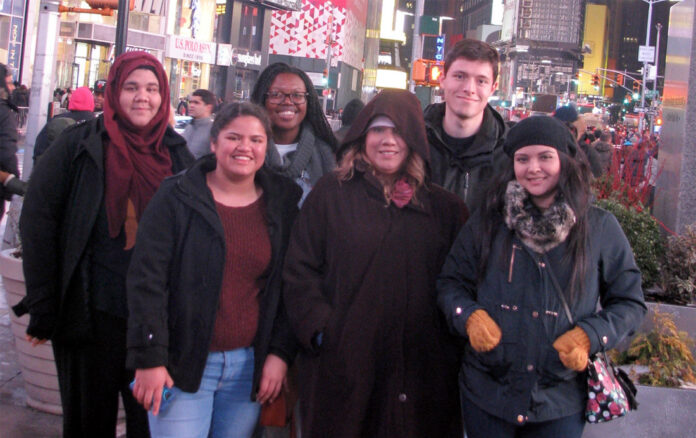BY Vicky Brito
Six UTRGV students attended the annual Model United Nations conference in New York City, March 19-23, as part of a special topics in political science course that focused on the activities of the UN.
The course is taught by Dr. Michelle Keck, UTRGV associate professor of political science, who also is the adviser for the UTRGV Model UN Club. Following are the UTRGV students who participated:
- Jacqueline Chavez Hita Jimenez, political science and history major, junior.
- Janet Ekezie, political science major, senior.
- Rina Y. Garza, political science major, senior.
- Stephania Montes De Oca, political science major, Mathematics and Science Academy.
- Michael Schlater, political science major, junior.
- Ebony Sauceda, law and justice major, junior.
This was the first out-of-state conference for all six students.
At each conference, there is a focus on three pressing issues relevant to the 21 UN committees in existence. This conference focused on issues in correlation with the World Health Organization, the UN Environmental Assembly and the International Atomic Energy Agency.
The students served as delegates representing the Dominican Republic, and had the opportunity to meet with representatives of the Caribbean country for a mission briefing before the conference, to learn specifics about the country’s global policies.
Prior to the trip, the students searched the Model UN archives for data to write position papers to accurately represent the country’s stance on the issues that were discussed at the conference.
“That in itself took several hours and days of our research schedule, because the database has unique ways of cataloging all these documents,” said junior Michael Schlater. “Some of us represented different groups in the Dominican Republic, such as the World Health Organization. We had a lot of treaties and resolutions to read through. It was really hard, looking for the correct information needed to write our position papers.”
Keck said the group conducted in-depth research with the information provided by the UN’s databases. Because the Dominican Republic is a predominately Spanish-speaking nation, that factor made research and translation more difficult.
“They did a lot of really in-depth research, because the U.N. has a ton of data but you have to know where to go look and find it,” Keck said. “Small countries might not be covered in the worldwide media as much, so you have to spend a lot more time digging in the UN’s data as well.”
Global awareness also serves as a key factor to the student’s overall learning experience in foreign government and politics.
Schlater said it is important that Model UN helps provides perspective.
“Going to New York and representing the Dominican Republic was a very exciting experience,” he said. “We had to make sure that the things we were asking for in our position were in line with the Dominican Republic’s real-life interests.”
Senior Janet Ekezie said the experience greatly expanded her knowledge of the field of political science.
“National Model UN was one of the most enriching encounters of my life,” she said. “I’ve traveled quite a lot and met various people from distinct parts of the world, but this conference almost superseded those endeavors. From meeting with a diplomat at the Dominican Republic’s Permanent Mission to the UN, to working with other delegates in my committee and discussing ways to implement the Paris Agreement, I could hardly imagine a more inspirational experience than Model UN.”
The group hopes to recruit more students of various majors in the years to come. The upper level political science course will be offered again this coming fall and is open to all majors interested in attending the Model UN conference in 2018.
For more information on the RGV Model United Nations club, contact Keck at [email protected].
ABOUT MODEL UN
Model United Nations began in 1927 at Syracuse University. The conference provides cooperative, hands-on experimental leaning that allows students to confront a range of topics with the perspective of their assigned country or organization.




